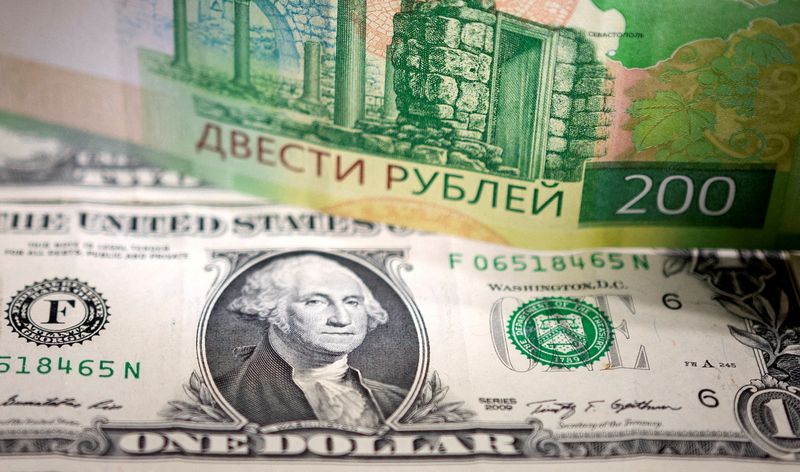(Reuters) -Russia's rouble tumbled to record lows in onshore trading on Wednesday despite measures by Moscow to shore up its battered economy and safeguard hard currency availability amid fresh economic sanctions triggered by its invasion of Ukraine.
Catching up after two days of market closure, the rouble jumped to 120.83 to the dollar on the Moscow Exchange before clawing back some losses to close at 120, or 12.5% softer than its Friday close.
It closed 6.3% weaker against the euro at 127 after hitting a record 131 per euro in early trade.
Offshore rouble trading was also thin with large disparities in pricing: On Refinitiv, the rouble stood at 129 to the dollar while on the EBS platform it was bid at 138 from the previous 130 close, down 5.8%.
Russia's financial markets have been thrown into turmoil since its invasion of Ukraine prompted severe economic sanctions.
On Wednesday, the European Union froze ties with the central bank of Belarus, an ally of Russia in its Ukrainian invasion, and top banks there.
"If we just take a step back and think about the near term, the headlines about lack of liquidity, how the military situation evolves, that will determine a lot of the near-term trading," said Yung-Yu Ma, chief investment strategist at BMO Wealth Management.
"But if we think about the long term economics, a very weak rouble certainly makes sense for the foreseeable future."
The central bank has more than doubled its key interest rate to 20% and the government has rolled out support measures, but Russian assets have been sold heavily and the rouble is now down around 30% against the dollar in Moscow since Russia sent troops into Ukraine on Feb. 24.
On Tuesday, the central bank said it was offering additional crisis support to financial firms and that banks were banned from selling foreign currency to its citizens for the next six months, a move seen aimed at preserving precious hard currency in the country.
The finance ministry said Russian banks will be allowed to lend to companies controlled by non-residents, which would allow companies wishing to do business in Russia to operate as usual.
Trading in equities on the Moscow Exchange remained closed. Stocks last traded in Moscow on Feb. 25.
BMO's Ma said that once the stock market reopens there is a chance that prices will drop further than what their longer-term value will be, but timing that will be very hard.
"It's certainly not something for anyone who is unwilling to take an extreme amount of risk because the reality is that many international investors simply want out and price doesn't really matter," said Ma.
Russia's 5-year credit default swaps - a measure of the cost of insuring exposure to the country - soared sharply to a record 2,960 basis points and was recently at 2,939 bps.
Annual inflation in Russia accelerated to 9.15% in February from 8.73% in January, its highest in seven years, with prices soaring further on a weakening rouble.

Michael Metcalfe, global head of macro strategy at State Street (NYSE:STT) Global Markets, said in a research note that there were signs prices in Russia had risen sharply since the rouble's slump - more so than in prior currency collapses.
"If it were sustained in the coming weeks and months, (this rate) could see the Russian annual inflation rate almost double in the coming months," Metcalfe wrote.